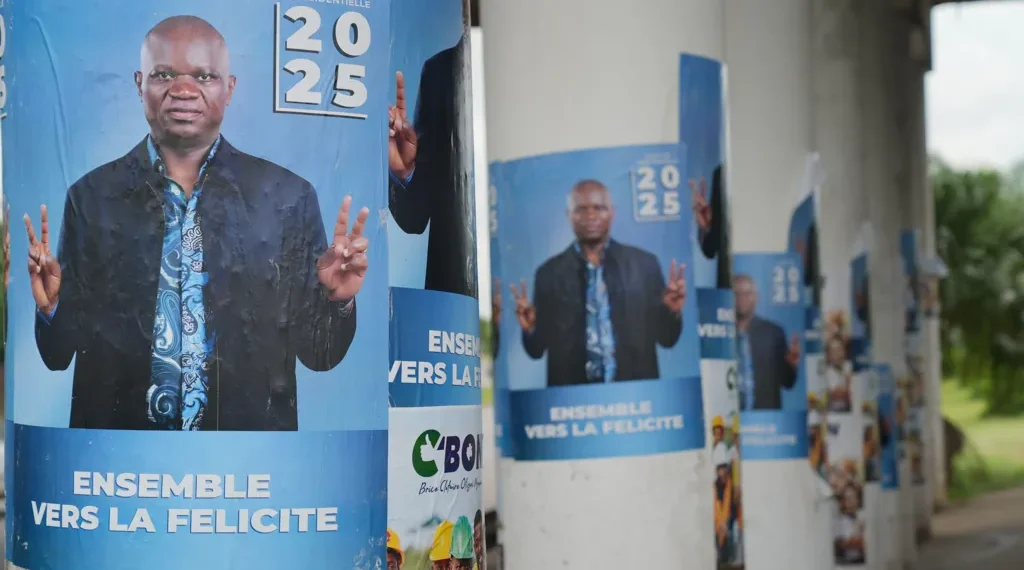Gen. Brice Clotaire Oligui Nguema, the military leader who seized power in a 2023 coup, is widely tipped to win Gabon’s first presidential election since the ousting of the Bongo dynasty, in a vote seen as a test of legitimacy for the transitional government.
The outcome of the Gabon post-coup presidential election 2025 is still pending, but early indications point to a commanding lead for Oligui, who had campaign representatives stationed at most of the over 3,000 polling stations nationwide. Local media report that he has so far secured most of the votes announced from the polling centers that have released results.
Oligui is competing against seven other candidates, including his closest challenger, former Prime Minister Alain Claude Bilie-By-Nze, who has criticized the process, alleging the use of state resources to boost the incumbent’s campaign — a claim the government denies.
Saturday’s vote was the first since the military ended more than 50 years of Bongo family rule by deposing President Ali Bongo Ondimba. With over 920,000 registered voters, including 28,000 abroad, the election is being closely watched both inside and outside the oil-rich Central African nation, where one-third of the 2.3 million population lives in poverty.
Gen. Brice Clotaire Oligui Nguema, who previously led the Republican Guard, cast his ballot in Libreville and declared confidence in the electoral process. “May the best man win,” he told reporters, adding that citizens were ready to “turn the page to join the new Republic.”
Election monitors from the Gabonese Civil Society Organizations Observation Mission reported that 94.8% of polling stations operated under satisfactory conditions, with 98.6% considered transparent. The mission found Oligui had representatives present in 69.6% of polling places they observed, while Bilie-By-Nze had just 8.2% coverage—an imbalance raising questions about fairness.

New Constitution Reshapes Political Power
This Gabon post-coup presidential election is also the first conducted under a new constitution adopted in 2024 by a national referendum.
The sweeping reforms abolished the office of Prime Minister, introduced a Vice President of the Government, and expanded presidential authority — including powers to dissolve both the National Assembly and the Constitutional Court under specific conditions.
In January 2025, a new electoral code was also approved, aligning the legal framework with the constitutional overhaul and reinforcing Gabon’s shift to a strong presidential system.
Despite the formal transition back to electoral politics, not all voters are convinced of the military’s commitment to reform. “I’m telling you that for me, the military has failed,” said Antoine Nkili, a 27-year-old law graduate who remains unemployed.
“They promised to reform the institutions, but they haven’t. Instead, they’ve enriched themselves.”
Antoine Nkili
Bilie-By-Nze, speaking after casting his vote in northern Gabon, warned that “unused voting cards” might be used to manipulate results. No evidence has been presented to support the claim, but it has added to suspicions among critics of the transitional leadership.
Still, some observers have noted improvements in transparency and organization compared to previous elections under the Bongo regime, even as concerns linger about the overwhelming influence of the interim president’s camp.
For Oligui, a win would consolidate his grip on power with a full seven-year mandate. For many Gabonese, however, the hope remains that this election will mark more than just a symbolic shift — that it will begin to address deep-rooted issues of inequality, corruption, and governance that have long plagued the country.
The final results are expected in the coming days. Until then, the people of Gabon, and the international community, wait to see if this election will prove to be a true step forward — or simply the military’s mandate cloaked in civilian robes.
READ ALSO: Police Arrest Notorious Kingpin Behind Nationwide Vehicle Theft Syndicate




















